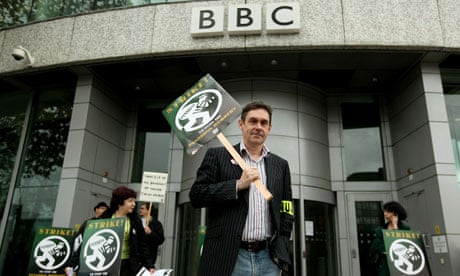The BBC is facing another day of disruption to its news programmes on Monday with many of its journalists due to go on a 24-hour strike before beginning an "indefinite" work to rule.
The industrial action by the National Union of Journalists is taking place in protest over compulsory redundancies. It follows a 24-hour stoppage on 15 July which led to BBC1's Breakfast and BBC2's Newsnight being taken off air.
There was also disruption to BBC Radio 4's Today and the breakfast show on BBC Radio 5 Live, and the 24-hour TV news channel, BBC News. Star reporters who took part in the stoppage included BBC business editor Robert Peston and the corporation's political editor, Nick Robinson.
Michelle Stanistreet, the NUJ's general secretary, said: "It is only two weeks since we took our last 24-hour strike action when there was a clear impact on programming and I would expect it to be another solid turnout by NUJ members across the BBC.
"They are angry at the way their colleagues are being treated and I would expect there to be significant impact on programming.
"It is unfortunate and our members don't want to be in this position but they are absolutely taking this action for the right reasons."
A total of 387 posts are due to be scrapped across the BBC World Service and BBC Monitoring – of which around 100 are expected to be compulsory – following a cut in government funding.
Four people have so far left the World Service after being made compulsorily redundant, with another 43 due to leave on the day of the strike.
Stanistreet said there was frustration at BBC management's approach to redeployment and described it as a "deeply baffling process" for the people involved. The NUJ claimed the BBC filled 355 posts in June, but said only 17 of them were given to people at risk of redundancy.
BBC management is due to meet with all the broadcasting unions on 11 August to discuss the corporation's approach to redundancies. One member of BBC staff privately suggested the union had "played its hand too quickly" with more widescale redundancies likely as a result of BBC director general Mark Thompson's Delivering Quality First cost-saving initiative.
But Stanistreet said: "The strong message coming to us from chapels up and down the BBC is that they know if the BBC is allowed to take this approach and force people out in this way they will carry on doing it when we face bigger cuts in the autumn."
A BBC spokesman said: "We are disappointed that the NUJ is intending to strike and apologise to our audience for any disruption to services this may cause.
"Industrial action will not alter the fact that the BBC is faced with a number of potential compulsory redundancies, following significant cuts to the central government grants that support the World Service and BBC Monitoring. We will continue with our efforts to reduce the need for compulsory redundancies.
"However, the number of posts that we are having to close means that unfortunately it is likely to be impossible for us to avoid some compulsory redundancies."
The BBC said the NUJ figures on redeployment were out of context and said it had "worked to redeploy staff whenever possible" including 27% of staff at risk of compulsory redundancy at the BBC World Service.
As many as 1,000 further journalism posts could be lost across BBC News and the World Service as part of plans to merge the two news-gathering operations.
The corporation's news department has lost more than 400 posts over the past four years in a previous cost-cutting initiative.
The strike will last for 24 hours on Monday, with the work to rule due to begin immediately afterwards. The NUJ held a 48-hour strike in November last year in protest at pension changes.
